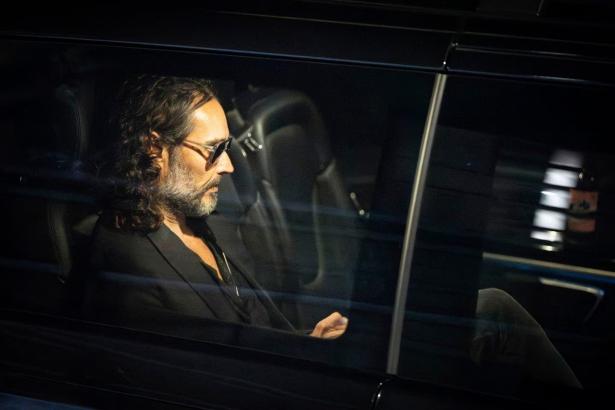On a recent episode of “Pod Save The UK,” hosts Coco Khan and Nish Kumar dissected the sexual assault allegations made by four women against comedian Russell Brand in a recent joint investigation conducted by several British media outlets.
Before the story broke, Khan said there were rumors about a “potentially career-ending exposé” and speculation that its subject could be a comedian. When she asked Kumar, who is a comedian, if he knew who it would be, he said, “Yes.”
“This is a well-known open secret from the comedy circuit,” Kumar said about the accusations, which Brand has denied. “It’s been something that’s been talked about, certainly to my knowledge, for at least the last five years.”
There are no “open secrets.” There are only truths whispered and concealed, and the complicity that enables abusers.
Whenever a man — and it’s usually a man — is accused of engaging in sexual misconduct over a lengthy period of time, there are often those who wonder aloud why survivors waited so long to speak out. In her 2019 book, “What Do We Need Men For? A Modest Proposal,” writer E. Jean Carroll alleged Donald Trump sexually assaulted her the mid-1990s. She also answered why she concealed it for decades.
“Receiving death threats, being driven from my home, being dismissed, being dragged through the mud, and joining the 15 women who’ve come forward with credible stories about how grabbed, badgered, belittled, mauled, molested, and assaulted them, only to see the man turn it around, deny, threaten, and attack them, never sounded like much fun. Also, I am a coward,” Carroll wrote. In May, she was awarded $5 million in damages after a civil jury in New York found that Trump had sexually abused and defamed Carroll.
But few seem to wonder why everyone else who knows — employees, journalists, business associates, and others — choose silence and then parade their inside knowledge after the survivors can no longer bear their terrible secrets and find someone willing to listen without prejudice.
In a devastating essay after dozens of sexual assault accusations against Bill Cosby finally became headline news in 2014 — thanks to comedian Hannibal Buress, who publicly called Cosby “a rapist” — David Carr, the late New York Times media critic, lacerated Cosby’s enablers — including Carr himself.
Rethinking a 2011 interview with Cosby, Carr admitted that he “never found the space or the time to ask him why so many women had accused him of drugging and then assaulting them. We all have our excuses, but in ignoring these claims, we let down the women who were brave enough to speak out publicly against a powerful entertainer.”
Between 2006 and 2013 — the period of the investigated allegations — Brand was at his peak. Well-received feature turns in comedies like “Forgetting Sarah Marshall” led to starring roles in “Get Him to the Greek” and “Arthur.” He usually played some variation of the wild, loutish, but somewhat lovable lech.
But around 2018, Brand’s ascent suddenly started to stall. That’s because, Kumar says, “increasingly people were just not willing to work with him” because of mounting, but still not public, accusations. In recent years, Brand has spent most of his time on solo projects, including his now-demonetized YouTube channel.
“The only power people had was to withdraw participation in shows involving Russell Brand,” Kumar said.
But was that enough? In societies that have made “See something, say something” a mantra, that needs to include sexual misconduct so survivors feel protected. And it shouldn’t only apply in the entertainment business. In every workplace there are men to avoid riding with in an elevator and whose after-work invitations should always be declined. But too often and without repercussions, that doesn’t stop predators who move on to new targets. Think of all those pedophile priests shuffled between parishes instead of having their crimes reported to the authorities.
“Watching [the Brand investigation] as a cisgendered heterosexual male comedian, you feel a certain sense of guilt and certain sense of complicity because you’ve been working with production companies and producers who are providing an infrastructure that allows predators to thrive,” Kumar said on his podcast. He later added, “There has to be accountability for Russell Brand; but there also has to be accountability for the decision makers who facilitated Russell Brand.”
Not just the decision makers at the top. Where’s the accountability for all who know these so-called open secrets but don’t report them? They are also facilitators who allow abusers to keep their careers intact and their reputations unscathed, and permit their violence to continue.
The question should never be why survivors don’t speak up sooner. It should only be why others so often choose to grant abusers and rapists their most powerful and necessary weapon — silence.
Renée Graham is a Globe columnist. She can be reached at renee.graham@globe.com. Follow her @reneeygraham.


Spread the word